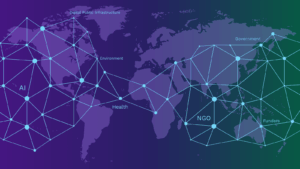From October 2021 to October 2022, 8 researchers and early career scholars from 8 countries participated in the Datasphere Initiative’s first Fellowship Program exploring the concept of the Datasphere and identifying ways it can be applied to evolving data governance challenges.
Fellows had diverse academic and professional backgrounds including international law, healthcare, platform transparency, and open data. In addition to their individual work, they participated in mini-research sprints and monthly virtual meet-ups exploring cross-cutting data governance topics and pioneering new thinking on the interdependencies between data, human groups, and norms.
On October 13, 2022, Fellows shared highlights of their research, – including a large literature review of the term “data governance” – during an online event with academic and policy professionals. The event “Think global, act responsibly: research insights for the Datasphere” was organized by Datasphere Initiative in partnership with Ostrom Workshop, Tilburg University Law School, Ontario Veterinary College (OVC) at the University of Guelph, ITS Rio, and the Global Burden of Animal Diseases (GBADs).
The discussions provided an opportunity for Fellows to present their research findings, which experts were invited to comment on, and then participants were invited to discuss in working groups. The discussions underscored how practitioners across sectors and research disciplines are grappling with the same problem: how to responsibly unlock the value of data and address the global and cross-sectoral impact of an increasingly fragmented set of technical and policy data governance norms and practices.
The Datasphere Initiative is grateful for the energy and substance Fellows and partners have contributed to this first year of the Fellowship and looks forward to future interactions and community building with the 2022-2023 cohort. This blog shares some important learnings from the event and the Fellows’ work:
Data Governance is a growing field that’s bringing together many distinct disciplines
Just over a decade ago, data governance was largely absent from academic literature, being mostly a term found in IT management handbooks. Today, hundreds of papers are published every year, and numerous organizations frame their mission around a piece of it and it is frequently discussed in policy debates. As part of his Fellowship at the Datasphere Initiative, Senior Fellow Tim Davies conducted a literature review and bibliometric analysis of the term to unpack its use in research areas ranging from organizational data sharing, data ethics, data, justice, and the social impact of how data is handled.
The final literature review will be released at the Internet Governance Forum 2022 during the Datasphere Initiative and Internet & Jurisdiction Policy Network TownHall on December 1, 2022 at 5:30pm – 6:30pm EAT / 3:30pm – 4:30pm CET (check your timezone). Register here to attend the IGF, which will be held in Addis Ababa in hybrid format.
Common problems point to a need to connect technical and policy angles
Many approach data governance within the context of a particular disciplinary standpoint – be it healthcare, agriculture, or security. Whatever the sector, there is close interconnection, yet separation between the technical and policy layers when studying data governance. Mr. Davies shared how the literature review underscored a need for more interactions between policymakers and technical communities. “When we unpack the norms of human groups, the assumptions involved, we can much better have that cross-learning,” he said.
Terminology is impacting the use and sharing of data
The lack of shared terminologies, data standards, and data interoperability is impacting practitioners’ abilities to responsibly unlock the value of data to its fullest potential. Fellows shared how the embedding of a particular definition in a legislation may have a real-life impact on how people can actually cooperate and share data. Datasphere Fellow Kassy Raymond, who has been cataloging and connecting naming conventions for data categories used in livestock population, shared her experience with some of the challenges that arise when policies specify different definitions of data categories “This influences the meaning of data and the interoperability of data between the different sources” she said.
- Read Kassy Raymond’s work on graph data and mapping livestock population data categories
There is a tension between national policy objectives and the global externalities of these actions
Many governments are dealing with the challenge of benefitting from the exchange of data and the desire for “data sovereignty”. Fellows pointed to the difference in approaches to addressing this tension, which was also identified in the We Need To Talk About Data report authored by Lorrayne Porciuncula, and Bertrand de La Chapelle.
In the European Union, rules introduced by the Data Governance Act and the Data Act underpin a renewed geopolitical ambition of the European Commission in global data governance discussions. Brazil, on the other hand, faces a dilemma on the scale of flexibility and rigidity it aims to take with facilitating data transfers. While Africa, through initiatives such as the African Union Data Policy Framework, is seeking to establish its own path in managing data flows across the region.
Fellows identified scalability and replication of regulatory objectives as key factors that legislators should explore when designing policies with extraterritorial impacts to avoid further fragmenting approaches to the management of global data flows.
- Read Francesco Vogelezang’s work on the Data Act and the Data Governance Act as well as his essay “The rise of European data? A Kantian imperative for global data governance”
- Read Christian Perrone’s work on requesting access to data overseas perspective from Brazil and regulating international data transfers
- Read Nashilongo Gervasius’s work on open data in Namibia
Communities are starting to understand the value of data but face top-down governance practices
As more and more populations start to understand the potential value of their data, different data-sharing communities are on the rise, notably: data trusts, data collectives, data fiduciaries, and even data unions. Fellow Magdalena Ewa Jozwiak reflected on how transparency often has a limited role in ensuring accountability in data governance and how the lack of data literacy can act as a barrier to data subjects fully leveraging their rights. Benjamin Akintunde Akinmoyeje’s research agenda on patient-centric approaches to the collection of health data complemented these insights by pointing to examples of how communities themselves can play an active role in standardizing and building standards on the ground to allow for data sharing.
- Read Magdalena Ewa Jozwiak’s work on platform transparency and feminist perspectives
A holistic approach to data governance means understanding not only how data is used but also why it is collected
Understanding the use of data and the action it enables can vastly impact the selection, the representation and thus the value of data itself. Kasia Chmielinski, Co-Founder of The Data Nutrition Project who was invited to share comments on the Fellows’ research findings underscored the need to understand the intention of data used and collected. Datasphere Fellow Asaf Lubin shared his research on the use of data in times of war presenting the current human rights frameworks at play and the need for future international legal frameworks to protect digital rights in times of armed conflict.
- Read Asaf Lubin’s work on Data in War and the Metaverse
There’s more to come
The 2021/2022 Fellowship resources and documentation including videos and blogs are available on the Datasphere Initiative Fellowship 2021/2022 website page as a resource for universities and organizations working on data governance policy and research. A recording of the event can be found here. These reporting materials will be complemented by a publication presenting the full outcomes of the Datasphere Initiative 2021/2022 Fellowship to be published in the coming weeks.
Building on the insights of the first cohort, the Datasphere Initiative is pleased to welcome the second cohort of Fellows for 2022/2023. 7 Fellows will receive mentorship from the Datasphere Initiative team and partners around the globe to think critically and develop research and solutions outputs for pressing challenges related to data governance and the Sustainable Development Goals (SDGs).
Read more about the 2022/2023 Datasphere Initiative Fellows and their research agendas here.




